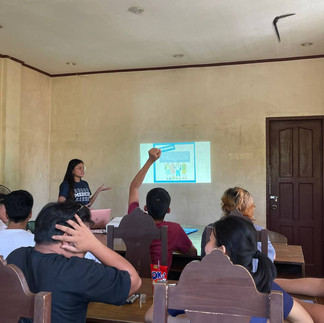Last Community Immersion
- Civitias Medicos
- Aug 16, 2024
- 4 min read
The Ateneo de Zamboanga University-School of Medicine aims to help provide solutions to the health problems of Western Mindanao and beyond. As part of this mission, our group was assigned to Barangay Tulungatung to help tackle its key health issues. Based on the community health assessment conducted by the group together with the barangay council and the community residents, four major concerns were identified namely, high populace of unvaccinated household pets, high incidence of hypertension, improper solid waste management, and high prevalence of teenage pregnancies. Over the four years of our community immersion, our group has initiated several activities and programs to address these pressing community problems.
To address the problem of high populace of unvaccinated pets, the team had partnered with the Office of the City Veterinary and Mount Pulong Bato Masonic Lodge to conduct a mass anti-rabies vaccination campaign from March -July 2024. This efforts has resulted in the vaccination 497 registered pets. This initiative not only helped prevent the spread of rabies in the community but also promoted responsible pet ownership.
A key milestone in our efforts to increase the number of controlled hypertensive individuals was the collaboration with the Office of the Vice President, which allowed us to procure and distribute medicines to residents in need. This partnership ensured that hypertensive individuals had consistent access to maintenance medications, effectively addressing one of the major barriers to medication adherence.
To strengthen the "Cuidate! El Corazon es tu Vida Program" implementation, our team conducted a refresher course and training for core group members, focusing on enhancing their skills in accurate BP measurement and familiarizing them with the proper referral system for hypertension management. This training ensured they could provide a reliable support and refer individuals to the barangay health center when needed, fostering a responsive and efficient healthcare network within the barangay.
Programs on Solid Waste Management emphasized community empowerment and social mobilization as central strategies to improve waste segregation and disposal practices among the households. A key initiative was the construction of Waste Holding Facilities (WHFs), where residents, barangay officials, and BESWMC actively participated in every phase from planning, building, constructing and installing WHFs. As a result, 10 WHFs were built and strategically placed across all 7 zones, including key areas like Tulungatung schools and barangay hall. This collective effort fostered a sense of ownership and responsibility within the community, empowering residents to take charge of their environment.
In addition to infrastructure, the team launched SWM information campaign. A total of 300 sacks, labeled "nabubulok," "di nabubulok," and "nareresiklo," were distributed to 100 households to promote proper waste segregation at the household level. Pamphlets on SWM were distributed among the residents, and signage was installed near WHFs and public spaces to educate residents on responsible waste disposal. Public waste receptacles were placed to reduce littering and encourage proper waste disposal practices even outside their homes.
Through Project Gardenator, in partnership with the Association of Tulungatung Innovative Women Agripreneurs (ATIWA), the team introduced composting and gardening techniques. This project actively engaged residents, enabling them to turn waste into resources while fostering sustainable practices.
To strengthen the sustainability of our programs, peer-to-peer education were incorporated into the community health plans, utilizing peer influence to ensure continued engagement. For this reason, the group organized a Youth Leaders Training on Proper Solid Waste Management to equip them with necessary knowledge and skills to handle issues on improper solid waste management. All SWM programs related to the youth were then handed over by our group to the SK officials, who will continue to implement and monitor these programs.
Furthermore, a comprehensive peer training program on teenage pregnancy prevention was conducted among youth leaders and SK officials. This program equipped participants with knowledge about reproductive health, contraceptive use, and the social and economic impacts of teenage pregnancy. By empowering youth leaders with this crucial information, they can effectively educate their peers, thereby creating a supportive network that fosters informed decision-making and healthy behaviors. Additionally, Peer-to-Peer Education through teen hub were conducted by our group at Tulungatung National High School, where selected students were trained to be peer educators. These peer educators were trained to facilitate discussions on sexual and reproductive health and provide resources to help students navigate the challenges of adolescence and make responsible choices.
Moreover, the strategies for teenage pregnancy prevention programs extend beyond school premises to engage out-of-school youth and teenage mothers. These initiatives empower young individuals to make informed decisions about their reproductive health and understand the associated risks. The group ensure that all adolescents, regardless of their educational status, receive the necessary support and guidance. These holistic approaches foster a more inclusive environment where young people can learn and grow, ultimately contributing to healthier communities.
As we conclude our 10-month immersion, our group officially held a Disengagement Program for the community. This program was prepared to express our sincerest gratitude to Barangay Tulungatung, which has been our home during this period. The Disengagement Ceremony commenced with an inspiring message from our community preceptor, Dr. Shawa Tan-Ganih, who highlighted the importance of collaboration and community engagement in achieving our goals. Our group then performed an intermission number that showcased the spirit and creativity fostered throughout our time in the community. A video presentation was also shared, capturing the essence of our experiences and activities, from daily interactions to significant milestones. One of the highlight of the program was the turnover of the "Key to Sustainability", where our projects were officially turnover to the barangay council and the core group of each CHPs for ongoing sustainability and monitoring. As a token of appreciation, plaques were presented to individuals and groups who played pivotal roles in helping us achieve our Community Health Program (CHP) goals. These acknowledgments reflects the invaluable support and cooperation we received from the community, without which our initiatives would not have been possible. The Disengagement Program served not only as a farewell but also as a celebration of the bonds forged and the collective efforts made to improve the well-being of Barangay Tulungatung.











































































Comments